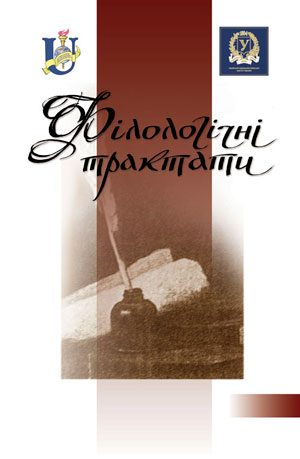FEATURES OF THE FORMATION OF KINOPOETICS IN THE FICTION DISCOURSE OF VLADIMIR NABOKOV
Keywords:
Vladimir Nabokov, cinematograph, kinopoetics, cinematographic elements, screen adaptation, screenplay, fiction discourseAbstract
The article considers the manifestation of cinematography in V. Nabokov's fiction discourse. The analysis of the peculiarities of the origin and functioning of cinematography in the fiction discourse of V. Nabokov is important for understanding the place and role of cinema in the author's novel work and, in particular, for understanding some semantic, ideological and plot aspects. The analysis is based on the analysis of the author's English-language novels: «Laughter in the Dark», «Lolita», «Pale Fire» and «The Original of Laura». The article also aims to continue the research of cinema poetics in the novel work of V. Nabokov in general. The article examines the influence of cinematography on the life and work of the writer V. Nabokov. We update the essential role of cinematography in the Berlin period of the writer's work. We trace the implementation of cinematography through the author's dramaturgical work. In English-language novels, we note cinematic elements and trace their place and meaning. We turn to the script of the film adaptation of «Lolita» and the writer's epistolary with directors S. Kubrick and A. Hitchcock. We trace the reflection of technical, semantic, and aesthetic elements in the artistic discourse of V. Nabokov.References
Appel A. Nabokov`s Dark Cinema. Oxford University Press Inc., 1975. 334 p.
Boyd B. Vladimir Nabokov: The American Years. Princeton University Press, 1991. 800 p.
Boyd B. Vladimir Nabokov: The Russian Years. Princeton University Press, 1993. 619 p.
Calapinto J. Nabokov and the movies. The New Yorker, 2015. URL: https://www.newyorker.com/books/page-turner/adapting-nabokov (дата звернення: 01.09.2022)
Evans W. The Conjuror in The Potato Elf. Nabokov’s Fifth Arc: Nabokov and Others on His Life’s Work / Ed. by J.E. Rivers, Ch. Nicol. Austin, 1982.
Larson D. Films into Books: An Analytical Bibliography of Film Novelizations, Movie, and TV Tie-Ins. London: Scarecrow Press, 1995.
Friedman N. Point of view in fiction. The theory of the novel. Ed. By Stevick Ph. N.Y., 1967. P.108-139.
Maar M. Speak, Nabokov. London, 2009.
Nabokov V. Lolita. Penguin, 2011. 368 p.
Nabokov V. Lolita. Screenplay. International Edition, 1997. 240 p.
Nabokov V. The Assistant Producer. The Atlantic. URL: https://www.theatlantic.com/magazine/archive/1943/05/the-assistant-producer/656407/ (дата звернення: 04.10.2022)
Nabokov V. The Original of Laura: Dying Is Fun A Novel in Fragments. Penguin, 2012. 304 p.
Nabokov V. Pale fire. Pengiun, Penguin Modern Classic, 2000. 256 p.
Nabokov V. Speak, Memory. An Autobiography Revisited. Pengiun, Penguin Modern Classic, 2000. 256 p.
Piwinska M. Adapting tone from novel to film: Vladimir Nabokov’s Lolita and its film adaptation by Stanley Kubrick. Literatura i Kultura Popularna XXIV, Wrocław, 2018. P. 199-207.
Shrayer M. The World of Nabokov’s Stories. Austin, 1999.
Wyllie B. Nabokov and the Movies: Film Perspectives in Fiction. McFarland, 2003. 308 p.














